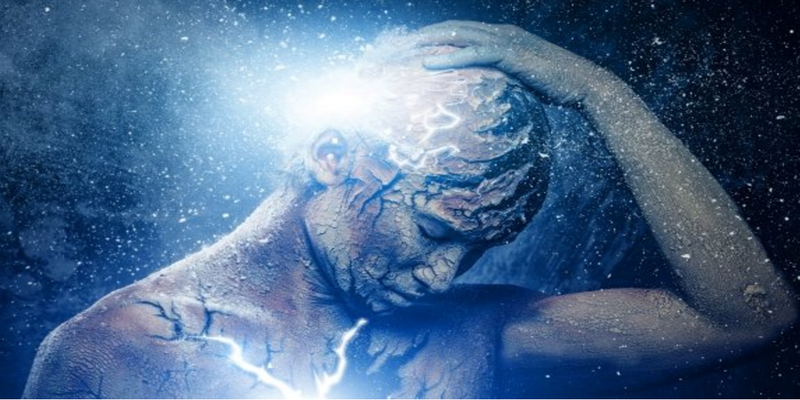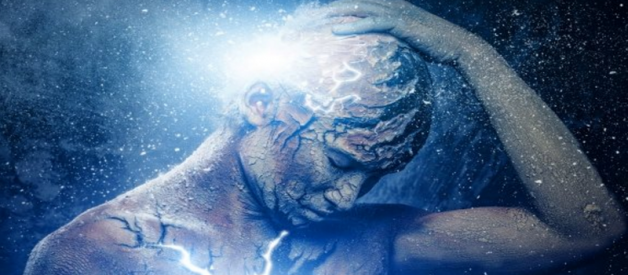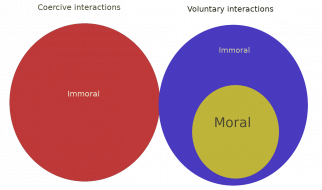
Although our sense of individual identity???our sense of ?self,? if you will???only begins to develop in late childhood, most of us take for granted that we are identical with the ?self? that inhabits our consciousness. Going through life with the internal monologue of our individual ego, narrating from the vantage point of our first-person awareness, we come to understand that internal narrator as our ?self.? We identify it with the ?I? who speaks, who thinks, who is aware from this subjectivity that is our own.
But how real is this identity? How valid is this assumption that ?I? am the same person, the same being, as this egoic narrator that I call my ?self?? And what would it mean if this identity were not so real, or so important, after all?
In moments of peak experience???whether they be caused by psychedelic drugs, mystical or religious experiences, or ?flow? states???we can experience the temporary loss of the ego, and are often happier for it. Moreover, in these heightened states of consciousness, conscious awareness persists even when the ego or the ?self? disappears, usually accompanied by feelings of joy, connectedness and love.
In what follows, I want to explore this phenomenon of ego-death or self-forgetting under its various forms and causes, and explore what this might mean for us as individuals and as a species.
?Lose yourself?
?Losing yourself? is one way to describe what happens when, engrossed in an activity we love, utterly preoccupied by its rhythm, demands and energy, we forget ourselves for a while. The psychologist Mihaly Csikszentmihalyi calls this ?flow?, or ?optimal experience,? consisting of ?situations in which attention can be freely invested to achieve a person?s goals, because there is no disorder to straighten out, no threat for the self to defend against? (Flow, 1990: 40). While normal consciousness is marked by the internal monologue of our ego navigating its way through the world, this internal chatter seems to die down and fall silent when we become absorbed in an activity that we enjoy. The ego ceases its rumination and our flow of concentration becomes an almost meditative state.
Human beings have, since time immemorial and across all known cultures, had various ways of ?getting out of ourselves? or ?getting out of our heads.? This is the origin of the term ?ecstasy?: the Greek ek-stasis, meaning ?standing outside of oneself.? The human ego???dominated by rumination about our future, our relationships, our status???can be an anxious and claustrophobic place to inhabit. Moreover, many of us are unhappy with the identity and the story that we associate with our ?self.? Seeking release, or escape, from the chatter of the ego, human beings instinctively seek ways to either shut-down (e.g., with alcohol or opiates), drown out (with mindless distractions or entertainment) or to transcend (e.g., through art and spirituality) our ruminative ego-selves.
This uncomfortable relationship with the ?self,? and our yearning to go beyond it via transcendence or escapism, is an essential part of the human condition. Healthy methods of self-transcendence are manifold, but our society rarely acknowledges them as such or gives them the attention they deserve. By finding out how we achieve flow and self-transcendence, and integrating such practices more meaningfully and prominently into our lives, we can flourish as happier and healthier human beings.
This idea is explored at length in Jules Evans? 2017 book, The Art of Losing Control: A Philosopher?s Search for Ecstatic Experience. A brief summary of his research appeared in the digital magazine Aeon, under the title, ?Dissolving the ego.? Evans? book provided me the impetus to investigate the topics of ecstasy and transcendence, which have fascinated me and profoundly influenced my life since I had my own powerful experiences of transcendence when I was 18 years old. In his Aeon article, Evans writes,
?In its most common-garden variety, we can seek what the psychologist Mihaly Csikszentmihalyi called ?flow?. By this he meant moments where we become so absorbed in an activity that we forget ourselves and lose track of time. We could lose ourselves in a good book, for example, or a computer game. [?] Such everyday moments might seem a long way from the mystical ecstasy of St Teresa of vila, but I would suggest that there is a continuum from moments of light absorption and ego-loss to much deeper and more dramatic ego-dissolution. Csikszentmihalyi agrees, saying that moments of flow are ?the kind of experience which culminates in ecstasy?. You don?t expect a full-on ecstatic experience every time you go to a concert, museum, mountain or date. But you know that, on a good day, you might just be transported.?
At one end of the spectrum, as Evans points out, are the flow states we achieve when we ?lose ourselves? in an activity that absorbs our attention. However, more intense forms of this phenomenon are also found among altered states of consciousness, and may have a lot to tell us about ourselves, the ?self?, and human consciousness.
The ego-death
In psychedelic drug trips of a certain intensity, many people report experiencing an ?ego-death,? also known as ?ego-disintegration? or ?ego-dissolution?. In their 2016 study into this experience, Matthew M. Nour et. al (2016) describe ego-dissolution as ?a reduction in the self-referential awareness that defines normal waking consciousness? that ?has been reported with all classical psychedelic drugs.? According to the authors of the paper, ?this experience has been interpreted from a psychoanalytic perspective as a disruption of ego-boundaries, which results in a blurring of the distinction between self-representation and object-representation, and precludes the synthesis of self-representations into a coherent whole.?
In these experiences, users of psychedelic drugs often experience a loss of their usual separate sense of self, and the boundaries between the individual self and the external environment become blurred. This can vary in intensity from a simple sense of self-forgetfulness and heightened connectedness with others, to a full-blown dissolution of any individual sense of self, ego or identity. The onset of an ego-dissolution experience can be terrifying, while the ego fights for survival and resists any attempt to undermine its control over our consciousness. However, once achieved, the experience of ego dissolution is usually accompanied by feelings of joy, love, release and connectedness.
In a fascinating departure from his usual writing on food and botany, the American science journalist Michael Pollan in 2019 published How to Change Your Mind: The New Science of Psychedelics, exploring the science and phenomenology of psychedelic drugs. After interviewing hundreds of people who had experienced psychedelic drug trips, and after finally experimenting himself with psilocybin, LSD and DMT, Pollan wrote,
?Of all the phenomenological effects that people on psychedelics report, the dissolution of the ego seems to me by far the most important and the most therapeutic. I found little consensus on terminology among the researchers I interviewed, but when I unpack their metaphors and vocabularies ? whether spiritual, humanistic, psychoanalytical or neurological ? it is finally the loss of ego or self (what Jung called ?psychic death?) they?re suggesting is the key psychological driver of the experience. [?] Is it any wonder we would feel one with the universe when the boundaries between self and world that the ego patrols suddenly fall away?? (Pollan 2019: 389)
The mystical union
Ego-dissipation, or ego-death, is also found in many reports of mystical experiences, often in language similar to that used to describe psychedelic states of consciousness. From ancient ascetics through to contemporary mystics ? and putting aside the debates about whether such experiences are ?real? or purely mental phenomena ? the loss or dissolution of the individual self in the experience of union with God is a recurring motif throughout mystical literature. (Similar claims could be made about Buddhist accounts of Nirvana and Boddhicitta, but that would be beyond the scope of my understanding.)
In his treatise Contemplation and Its Forms, the Catholic mystic Hugh of St Victor (1090?1141) describes the experience of the soul united to God in the beatific vision. His language is remarkable for its descriptions of the forgetful dissolving of the self and loss of ego (memory, reason and will ?falling asleep?, their faculties suspended) in the ineffable joy of union with God:
?In this mode the intellectual soul, being totally enlightened by the splendour of the eternal light, constantly and perfectly hates sin, disregards the world, rejects the self and ? entire, apart, naked and pure ? moves on into God. [?] Sweet heavenly sleep snatches the soul that has been anointed in this way, and then it dissolves and rests in the embrace of the Highest Light. [?] As long as the soul is at rest, she then undergoes a kind of blessed sleep; forgetful of world and self, she is placed before and even upon God?s seat. The soul?s reason sleeps because , since it does not know the cause of such great happiness, it is not able to rasp its origin, progress and goal. The memory sleeps because what is totally lulled by ineffable rejoicing and sweetness can remember nothing of the past. The will sleeps because it is not aware of the sweetness of ineffable joy that it perceives. This is why the Apostle [Paul] says, ?He who adheres to God because one spirit with him (1 Cor 6:17). Therefore, the soul happily sleeps on, dead to self and world.?
Living at the same time as Hugo, the monastic reformer St Bernard of Clairvaux (1090?1153) provides another beautiful description of the loss of self in the loving union with God. Describing ?the fourth degree of love? in his treatise On Loving God, St Bernard writes,
?Happy the man who has attained the fourth degree of love; he no longer even loves himself except for God. ?O God, your justice is like the mountains of God? (Ps 35:7). This love is a mountain, God?s towering peak. [? ] When will this sort of affection be felt that, inebriated with divine love, the mind may forget itself and become in its own eyes like a broken dish, hastening towards God and clinging to him, becoming one with him in spirit, saying ?My flesh and my heart have wasted away; O God of my heart, O God, my share for eternity? (Ps 72:26)? I would say that man is blessed and holy to whom it is given to experience something of this sort, so rare in life, even if it be for but once and for the space of a moment. To lose yourself, as if you no longer existed, to cease completely to experience yourself, to reduce yourself to nothing is not a human sentiment but a divine experience.?
To draw examples from non-Christian traditions would be to venture ? possibly disrespectfully ? beyond the limits of my reading, but such compilations certainly exist. In his book The Perennial Philosophy (1944), Aldoux Huxley compiled diverse examples from Islamic, Christian, Buddhist and Hindu literature to show that mystical experience is a universal phenomenon, with common unifying characteristics such as the transcendence of the individual self. Other 20th and 21st century writers such as Frithjof Schuon, Huston Smith, Ananda Coomaraswarmy and James Cutsinger have also written on the similarities between mystics from different religious traditions to show that these mystical experiences are not limited to any single cultural context, but are a core aspect of human spirituality everywhere.
When we investigate the firsthand descriptions of these experiences, we once again see the phenomenon of self-forgetting and self-transcendence. In the heights of peak religious experience, not brought about by any kind of drug but rather experienced spontaneously, or as the culmination of ascetic practice, common elements are discernible: the forgetting of self, loss of ego and personal identity, and a transcendence of our separate ?self vs. other? dualism into a non-dual unitive experience.
So, what of it?
Peak experiences of flow, ecstasy, spirituality and losing ourselves in our hobbies are how we unwind, recalibrate, and tap into a higher state of mind, above the mud of our ruminative ego chatter. There is a strong case to be made that western society has unhealthily suppressed these kinds of experiences, and we need to work to rehabilitate and re-integrate them into our culture again. I will leave that argument for authors such as Jules Evans; what concerns me here is what these experiences disclose about the nature of the self.
In peak experiences of human consciousness, the most blissful mental states we can achieve ? whether they be from ?flow?, ?losing yourself to dance,? psychedelics or mysticism ? we notice a phenomenon which could, perhaps, tell us something about ourselves.
In all of these experiences, although the ego chatter of self-conscious rumination is forgotten (or in more powerful experiences, dissolved), conscious awareness persists, usually accompanied by intensely positive emotions. We can lose our ego, even our sense of self-identity, without losing our consciousness, subjectivity, or awareness of the world. As Pollan wrote, ?The psychedelic experience of non-duality suggests that consciousness survives the disappearance of the self, and that it is not so indispensable as we ? and it ? like to think? (2019: 205).
The fact that consciousness can persist without (liberated from!) the ego or the ?self? could have broad implications for psychology, the humanities, and for our own lives. Drawing out these consequences in depth is a work in progress, but here I want to lay out some questions that form an important point of departure:
If the ego can be so easily ? and radically ? destabilised, how essential is it to our real identity? If it can dissolve without impacting our ongoing conscious awareness, this raises serious questions about how ?real? the ego is and how we should perceive its agenda. How seriously would you take the anxieties and concerns of that voice inside your head if you knew that it was an illusion, a construct of a certain part of your brain that evolved to help you navigate external threats? What if the ?real you? is not, after all, that identity that you developed in late childhood, that narrative character inhabiting your subjective awareness who has memories, anxieties, desires and plans? If that is the case, who are you, really? Who am I, beneath all the stories of my ego, that can be washed away in a single blissful experience leaving me no worse off; the ?I? whose happiest times are when I forget those stories and that inner chatter subsides?
Grappling with these questions could be important for furthering human wellbeing and happiness. So many people are painfully, heavily invested in their identities, cripplingly attached to the stories of their own ego narrative; stories that hurt them over and over again because they take them so seriously. ?I must have justice! I?ve been wronged! They owe me! This isn?t how I wanted my life to turn out! I?m a loser! I need to prove myself to them!? Think of the narratives that people construct in their minds that they obsess over painfully for years. Could the smashing of the illusion (or idol?) of the human ego, the individual identity of the personal self, be key for liberating us from mental suffering and unhealthy habits of thought?
It would appear that, in the most meaningful and blissful states of consciousness that humans can achieve, these characteristics ? ego-dissolution, transcendence, ecstasy and non-dualism ? are recurrent. Is it a stretch to suggest that they disclose something about our true nature, beneath the illusion of the ego, by showing us what we are like when we achieve our highest forms of self-realisation?


